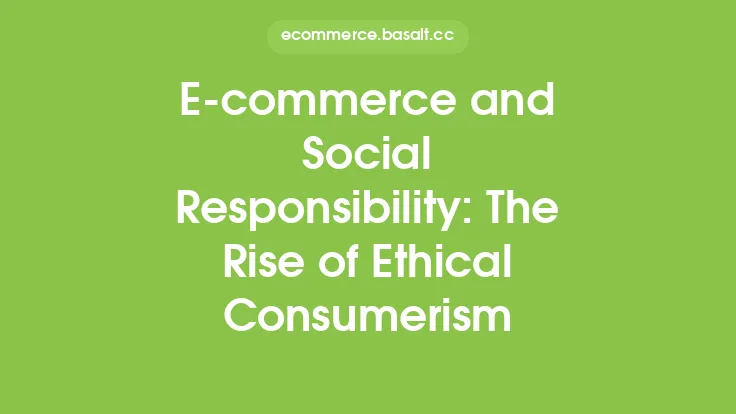In the ever-evolving landscape of e-commerce, building trust with consumers is paramount for long-term success. One crucial aspect that has gained significant attention in recent years is social responsibility. As consumers become more aware of the social and environmental impact of their purchasing decisions, e-commerce businesses are under increasing pressure to demonstrate their commitment to social responsibility. This involves not only ensuring that their operations are sustainable and environmentally friendly but also that they are fair, equitable, and beneficial to society as a whole.
Introduction to Social Responsibility in E-commerce
Social responsibility in e-commerce refers to the ethical obligation of online retailers to act in ways that enhance society and the environment, rather than solely focusing on profit maximization. This concept encompasses a wide range of practices, including fair labor standards, community engagement, philanthropy, and environmental stewardship. By embracing social responsibility, e-commerce businesses can foster a positive reputation, enhance customer loyalty, and ultimately drive business growth.
Building Trust through Transparency
Transparency is a cornerstone of social responsibility in e-commerce. Consumers want to know how their purchases are made, who makes them, and under what conditions. E-commerce businesses can build trust by being open about their supply chains, manufacturing processes, and environmental practices. This transparency can be achieved through clear labeling, detailed product descriptions, and regular reporting on social and environmental performance. By providing this information, businesses demonstrate their commitment to accountability and ethical practices, which can significantly enhance consumer trust.
The Role of Corporate Social Responsibility (CSR) Initiatives
Corporate Social Responsibility (CSR) initiatives play a vital role in demonstrating an e-commerce business's commitment to social responsibility. These initiatives can range from charitable donations and community programs to environmental conservation efforts and employee volunteer programs. CSR initiatives not only contribute to the well-being of society and the environment but also serve as a powerful tool for building brand reputation and customer loyalty. By engaging in CSR activities, e-commerce businesses can differentiate themselves from competitors and attract consumers who share similar values.
Engaging Consumers through Social Responsibility
Engaging consumers in social responsibility efforts is a powerful way to build trust and foster loyalty. This can be achieved through various means, such as crowdfunding for social causes, customer volunteer programs, and product lines that support specific social or environmental initiatives. By involving consumers in social responsibility efforts, e-commerce businesses can create a sense of community and shared purpose, which can lead to increased customer retention and advocacy.
Measuring the Impact of Social Responsibility
Measuring the impact of social responsibility efforts is crucial for e-commerce businesses to understand their effectiveness and identify areas for improvement. This can involve tracking key performance indicators (KPIs) such as carbon footprint reduction, community engagement metrics, and customer satisfaction surveys. By regularly assessing and reporting on their social responsibility performance, businesses can demonstrate their commitment to transparency and accountability, further enhancing trust with consumers.
Challenges and Opportunities
While social responsibility offers numerous benefits for e-commerce businesses, it also presents several challenges. One of the main challenges is balancing social responsibility with profitability, as some social and environmental initiatives may require significant investments. Additionally, ensuring the authenticity and effectiveness of social responsibility efforts can be complex, particularly in global supply chains. However, these challenges also present opportunities for innovation and differentiation. By embracing social responsibility and finding creative solutions to these challenges, e-commerce businesses can not only build trust with consumers but also drive long-term growth and success.
Conclusion
In conclusion, social responsibility plays a vital role in building trust with consumers in the e-commerce sector. By embracing transparency, engaging in CSR initiatives, and involving consumers in social responsibility efforts, e-commerce businesses can foster a positive reputation, enhance customer loyalty, and drive business growth. As consumers continue to prioritize social and environmental considerations in their purchasing decisions, the importance of social responsibility in e-commerce will only continue to grow. By understanding the evergreen aspects of social responsibility and incorporating them into their business models, e-commerce businesses can ensure long-term success and contribute to a more sustainable and equitable future.





